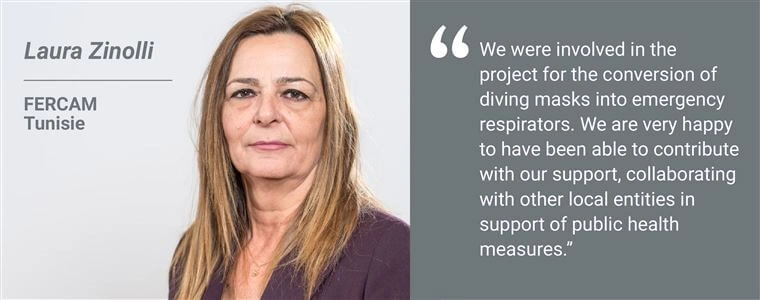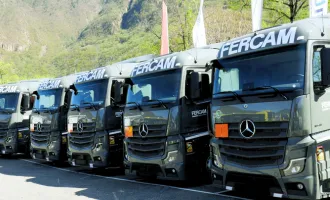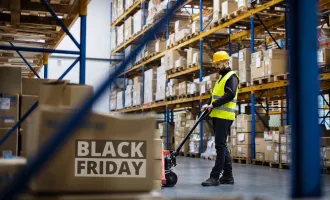

FERCAM Tunisia: how FERCAM’s international network reacted to the Covid-19 emergency
Answering a few questions, the Country Manager of FERCAM Tunisia, Laura Zinolli, outlines the picture of the health emergency in the country, from the rigid but positive management of the quarantine to the impacts on transport activities. Working from home was not possible, due to an insufficient digitalization of processes, but hope lies in future innovations.

What was your experience during the confinement phase?
The Tunisian government has put in place rather restrictive quarantine measures: in addition to the obligation of confinement at home or in one's own constituency, except for essential activities, a total curfew was in force from 21 to 6 in the morning, managed by the military. In order to reach the office, we requested nominative authorizations from the Ministry of the Interior: movements were only allowed along pre-approved routes, showing the permit number. Although in some moments it has been a difficult experience, the Tunisian security protocol has proved to be very effective: we have been one of the countries with the least number of infections and fatalities.
Also, within our offices we have established and continue to comply with very strict containment measures, as prescribed by the Ministry of Health. At the beginning of July, we were subjected to checks by the Labor Inspectorate, including medical examinations of staff. All the collaborators tested negative and healthy; I believe thanks to the prevention measures we have always respected.What impact has the Covid-19 emergency had on the activities of FERCAM Tunisia?
Airspace and passenger travel were closed, but freight ships were allowed to travel. We therefore continued to operate even during the lockdown period, albeit to a lesser extent, as some companies had suspended their activity. Initially, the government blocked all exports of health care products to ensure they could be available internally. Therefore, even companies in the fashion sector that promptly converted to produce gowns and masks for a period were unable to sell abroad and opted for the domestic market.
Many of our client companies have found themselves facing liquidity problems, caused by the cancellation of orders and government blockades. Companies with which we had never previously had problems with the timing of debt collection have specifically asked me to allow them to defer payments. We also handled return loads of raw materials. In June, however, the traffic was more substantial: many companies took steps to deliver what was produced before and during the lockdown. This is why I think that only in the autumn will we see the real consequences of the cancellation of orders for the summer period.
At FERCAM Tunisia for now we can consider ourselves lucky: despite the difficulties, the economic results of this period were not negative, but comparable to those of last year as a whole, and no one ran the risk of being unemployed.
Did you acquire new customers or have to manage new services?
Since it was no longer possible to import mail via air freight, thanks to a commercial arrangement made by Mr. Splendori, we have taken over this new service. We are therefore dealing with the transport of Tunisian correspondence from Italy by sea, a complex and interesting procedure, with specific customs clearance operations, which we manage in collaboration with the Tunisian post office.
How did you manage to remain operational during the lockdown period?
Having monitored the developments in Italy closely, even before Tunisia entered the lockdown phase, I made sure to procure masks and disinfectant gels to distribute to all collaborators. We stocked them up, so we had no supply problems and we were able to distribute them to those of our suppliers who hadn’t been able to procure them.
Unfortunately, it was not possible to work 100% from home, because the low level of digitization of local procedures does not allow all tasks to be managed remotely. All customs documentation, for example, can only be presented on paper. We have therefore organized working shifts, in order to limit the number of people in the office and to be able to respect the obligatory distancing. I also placed an external box for collecting driver documentation, to limit contact with outsiders to a minimum.
Has the need for a push towards digitalization and more modern methods also been perceived in Tunisia, as in some European countries?
There is a widespread desire and also projects to digitalize some bureaucratic procedures. In fact, during the lockdown period, new tools were made available, such as the electronic submission of monthly fiscal declarations.But I think it will be a slow process overall, there is resistance on a cultural level, habits that are difficult to scratch. We have all the necessary infrastructure, such as fast internet thanks to fiber connection, and experienced IT professionals, but as the private sector continues to advance, public administration cannot keep up. We hope that, once the delicate political moment we have been experiencing in recent weeks has been overcome, we can resume talking about public investments in order to make progress with the necessary innovations. However, I still remember when Telex was used ... I easily adapted to these methods too!
However, we feel like a relatively happy island, in a North Africa that continues to experience great difficulties. Just think of the neighboring nations: Libya, as we know, is enduring a decidedly dramatic moment in its history, but even Algeria has not yet been able to reopen its borders and continues to record a very high daily number of infections. We hope that foreign investors will be able to recognize Tunisia as a pioneering country, within the North African context, so as to support us in the future economic recovery.





























